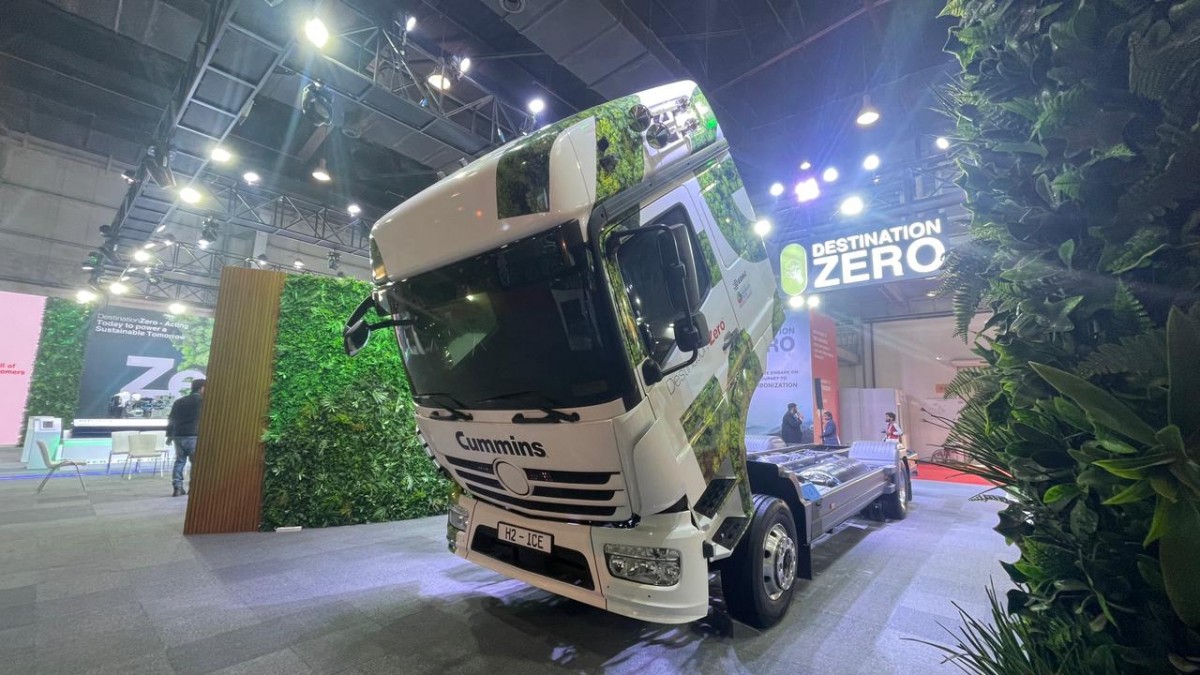

Cummins Group has showcased the first Fuel Agnostic Platform for commercial vehicles. According to the company, the way towards decarbonization is different for everyone, and some multiple approaches and technologies can be undertaken to reach the common end goal. Hence they have unveiled a new commercial vehicle platform that can zero emissions technology along with other low carbon solutions.
Being a well-known player in the power segment, Cummins has the right know-how and industry experience to launch such an innovative product. The fuel-agnostic platform showcases a practical direction towards the reduction of emissions. This technology is already known to all the stakeholders like OEMs, fleet managers and operators.
Further, the right path towards the common goal of reducing emissions can be achieved in different ways by the various entities. This means that current technologies in the low and zero carbon fuel systems can be tailor-made per the end user’s needs. To this effect, the users will have the flexibility to choose a technology as per their infrastructure, operations and, at the same time, optimize the logistics of transportation.
This fuel-agnostic platform uses a common base engine. It is fitted with cylinder heads and fuel systems that can accommodate a wide range of fuels like diesel, natural gas, renewable natural gas and hydrogen. The main talking point of the system is the fact that OEMs will get a common engine architecture across different fuel types resulting in a lot of common parts sharing, thereby reducing the costs.
This solution is for medium and heavy trucks. The B6.7H internal combustion engine (ICE) can be paired with green hydrogen, reducing zero well-to-wheel CO2 emissions. The engine would also be equipped with a 700 bar hydrogen tank that can ensure quick refills as well.
The engine would also be suitable for both trucks and buses. Hence it will enable decarbonization across many duty cycles.
This is a low-carbon technology that will lower emissions while at the same time not compromising on the performance requirement. The natural gas technology is readily available today, and engines that use this fuel are known to be proven. It is said that the share of natural gas will increase from 6 per cent to 15 per cent by 2030. At present, there are infra projects underway in both the CNG and LNG sectors.
The B6.H7 can deliver up to a 10 per cent reduction in CO2 compared to a conventional diesel engine. In fact, if biogas is used, it will result in a reduction of over 75 per cent of CO2. This will not just improve the air quality as per BS6 norms but also Euro VII norms as well.
Cummins has a vast experience in building diesel engines. They already have supplied almost 7,00,000 Euro VI compliant engines based on the company’s latest-generation diesel platform. This B6.7 engine is also capable of reducing emissions thanks to improvements in both power and torque numbers, along with compliance with BS6 OBD III emission norms.
Cummins has set an internal target of PLANET 2050. This means new environmental strategies, improving the communities the company operates in and using natural resources in a responsible manner. To this effect, Cummins has showcased some products to help their clients to transition towards zero emissions.
Electrolyzer – To generate green H2, the Electrolyzer takes in water and breaks it up into hydrogen and oxygen. When an Electrolyzer is powered by green energy, it is called green H2, as the entire process doesn’t have a carbon footprint. Cummins has deployed over 600 such Electrolyzers worldwide that use PEM and Alkaline technologies. A modular variant of this machine is displayed at the Auto Expo.
Hydrogen Fuel Cell – The Cummin’s fuel cell converts H2 into electricity. Based on the latest generation, this fuel cell will take in green H2 and provide a rated power of 125 kW in single and 240 kW in dual modules. These can be used in medium and heavy-duty applications with operating environments of -30 °C to 45 °C with up to 60% peak efficiency.
LPF Battery and NMC Battery Tech – LPH stands for Lithium Iron Phosphate, while NMC is for Nickel Manganese Cobalt. The battery pack solutions by Cummins cater to a wide range of requirements like charging times, weight, range and budget. The company also provides advanced battery management systems with such batteries.
14Xe ePowertrain – Cummins recently acquired Meritor, a supplier of drivetrain, mobility, braking and electric powertrain technologies. Thanks to this, Cummins will now be able to offer various electric powertrain solutions. The 14Xe ePowertrain is designed with an aim to fit multiple demands of different vehicle applications. It will offer high efficiency, low weight and better turning radius as compared to other electric powertrains.
Also Read – BYD Atto 3 Limited Edition launched at Auto Expo 2023.